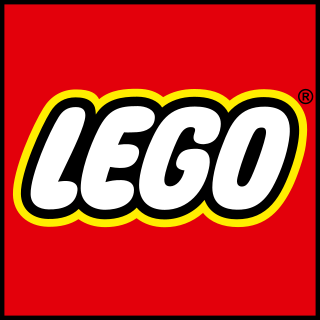Related Research Articles

Lego is a line of plastic construction toys that are manufactured by the Lego Group, a privately held company based in Billund, Denmark. Lego consists of variously colored interlocking plastic bricks made of acrylonitrile butadiene styrene that accompany an array of gears, figurines called minifigures, and various other parts. Lego pieces can be assembled and connected in many ways to construct objects, including vehicles, buildings, and working robots. Anything constructed can be taken apart again, and the pieces reused to make new things.

Lego Mindstorms is a discontinued hardware and software structure which develops programmable robots based on Lego bricks. Each version included a programmable microcontroller, a set of modular sensors and motors, and parts from the Lego Technic line to create mechanical systems. The system is controlled by the intelligent brick, which acts as the brain of the mechanical system.

A mobile device, also referred to as a digital assistant, is a computer, small enough to hold and operate in the hand. Mobile devices typically have a flat LCD or OLED screen, a touchscreen interface, and digital or physical buttons. They may also have a physical keyboard. Many such devices can connect to the Internet and connect with other devices such as car entertainment systems or headsets via Wi-Fi, Bluetooth, cellular networks or near field communication. Integrated cameras, the ability to place and receive voice and video telephone calls, video games, and Global Positioning System (GPS) capabilities are common. Power is typically provided by a lithium-ion battery. Mobile devices may run mobile operating systems that allow third-party applications to be installed and run.

Allan Alcorn is an American pioneering engineer and computer scientist best known for creating Pong, one of the first video games.

Schleich is a German producer of hand painted toy figurines and accessories. The company is headquartered in Schwäbisch Gmünd, Germany. In 2020, the group employed 440 people and generated sales of 188.7 million euros. Half of the sales are generated outside of the German domestic market, and Schleich branded play figurines and playsets are sold in over 60 countries. In 2022, the company sold a total of approximately 40 million figurines.

Lego City is a theme under which Lego building sets are released based on city life, with the models depicting city and emergency services, airport, train, construction, and civilian services. Legoland Town is one of the three original themes that Lego produced upon its launch of the Lego minifigure in 1978 along with Castle and Space. The Town brand was briefly replaced with Lego World City in 2003 and 2004 before it was simply rebranded as Lego City in 2005.
Lego Spider-Man is a product range of the Lego construction toy, based on the Marvel Comics character Spider-Man. When the theme first launched in 2002, it was inspired by the Spider-Man film released the same year and was part of the Lego Studios line. Additional sets were released two years later, based on the film's sequel, Spider-Man 2. The theme was discontinued before the release of Spider-Man 3, and the rights were sold to rival Mega Brands, who entered a multi-year licensing deal with Marvel Enterprises, giving them the rights to produce playsets, vehicles, and other building-themed products based upon various Marvel characters for their Mega Bloks toys.

The PlayStation Eye is a digital camera device, similar to a webcam, for the PlayStation 3. The technology uses computer vision and gesture recognition to process images taken by the camera. This allows players to interact with games using motion and color detection as well as sound through its built-in microphone array. It is the successor to the EyeToy for the PlayStation 2, which was released in 2003.
The Internet of things (IoT) describes devices with sensors, processing ability, software and other technologies that connect and exchange data with other devices and systems over the Internet or other communications networks. The Internet of things encompasses electronics, communication and computer science engineering. Internet of things has been considered a misnomer because devices do not need to be connected to the public internet, they only need to be connected to a network, and be individually addressable.
A smart toy is an interactive toy which effectively has its own intelligence by virtue of on-board electronics. These enable it to learn, behave according to preset patterns, and alter its actions depending upon environmental stimuli and user input. Typically, it can adjust to the abilities of the player. A modern smart toy has electronics consisting of one or more microprocessors or microcontrollers, volatile and/or non-volatile memory, storage devices, and various forms of input–output devices. It may be networked together with other smart toys or a personal computer in order to enhance its play value or educational features. Generally, the smart toy may be controlled by software which is embedded in firmware or else loaded from an input device such as a USB flash drive, Memory Stick or CD-ROM. Smart toys frequently have extensive multimedia capabilities, and these can be utilized to produce a realistic, animated, simulated personality for the toy. Some commercial examples of smart toys are Amazing Amanda, Furby and iDog. The first smart-toy was the Mego Corporation's 2-XL robot (2XL), invented in the 1970s
Lego Racers was a Lego product line with the first wave of sets being released in 2001. The range was first introduced in 2001 named after the Lego Racers video game series with the first wave of sets being based on the Xalax segment of Lego Racers 2. The earlier sets were designed more as racing car toys than construction toy, and included a launcher element that could be used to propel the vehicles. Over time the theme developed and became more in line with the style of other Lego products, while still encouraging a racing form of gameplay. The theme also included licensed models of real-life high-speed cars, such as a Lamborghini Gallardo and a Ferrari FXX. The product line was discontinued in 2013 after 12 years. A spiritual successor Lego Speed Champions was released in 2015, with a similar premise.
Lego Ninjago is a Lego theme that was created in 2011 and a flagship brand of The Lego Group. It is the first theme to be based on ninja since the discontinuation of the Lego Ninja theme in 2000. It was produced to coincide with the computer-animated television series Ninjago, which was superseded in 2023 by a new series titled Ninjago: Dragons Rising.

Lego Friends is a product range of Lego construction toys designed primarily for girls that was launched in 2012. It introduced "mini-doll" figures, which are about the same size as traditional Lego minifigures but are more detailed and realistic. The original cast consisted of Andrea, Olivia, Stephanie, Mia and Emma. The theme was rebooted and relaunched in January 2023 to focus on a more diverse cast of characters, the main cast now consisting of Aliya, Nova, Zac, Liann, Paisley, Leo, Autumn and Olly.

Lego Legends of Chima was a Lego theme that was introduced in 2013 and discontinued in 2015. The product line was based on the storyline of Legends of Chima, a 3D animated television series, which was produced to coincide with the Lego theme. The storyline was set in the fictional realm of "Chima", a fantasy world inhabited by various warring tribes of anthropomorphic animals that battle to collect a substance called "Chi". Alongside the television series and several shorts based on Lego Legends of Chima. The theme also produced a range of associated media, including theme park attractions, video games, apps, and publications.

Disney Infinity is a 2013 toys-to-life action-adventure game published by Disney Interactive Studios. It was announced on January 15, 2013. The game used collectible figurines that were then synchronized with the game, unlocking characters from Disney and Pixar properties that interact and go on adventures. The game was released for Xbox 360, PlayStation 3, Wii, Wii U, and Nintendo 3DS in August 2013. A PC version of Toy Box was also released on November 14, 2013. The game had a budget approaching $100 million. A sequel, Disney Infinity 2.0, was released on September 23, 2014. The third edition, Disney Infinity 3.0, was released on August 30, 2015, and introduced support for the Apple TV. This game was also later released on Microsoft Windows in 2013.

Disney Infinity was an action-adventure sandbox toys-to-life video game series developed by Avalanche Software. The setting of the series was a giant customizable universe of imagination, known as the Toy Box, populated with toy versions of iconic Disney, Pixar, Marvel and Star Wars characters.
Toys-to-life is a video game feature using physical figurines or action figures to interact within the game. These toys use a near field communication (NFC), radio frequency identification (RFID), or image recognition data protocol to determine the individual figurine's proximity, and save a player's progress data to a storage medium located within that piece. It was one of the most lucrative branches of the video game industry especially during the late 2000s and 2010s, with the Skylanders franchise alone selling more than $3 billion worth over the course of four years.
Lego Super Mario is a Lego theme based on the platform game series Super Mario created by Japanese game designer Shigeru Miyamoto. It is licensed from Nintendo. The theme was first introduced in 2020. Since its release, the Lego Super Mario theme has received generally positive reviews.

Lego Life of George was a Lego theme that for the first time, combined standard Lego bricks with a mobile app. The theme was first introduced in October 2011. It was eventually discontinued by the end of December 2013.
Silicon Gaming Inc. was an American gaming company founded in 1993 by a group of multimedia entertainment executives and technology specialists such as Robert M. Fell and Allan Alcorn with funding from angel investor David Shannon Morse. Silicon Gaming Inc. focused on applying various video gaming and computer technology to wagering products such as slot machines.
References
- 1 2 "Allan Alcorn: Video Games as a Driver of Computing Technology" (PDF). San Jose State University, The Department of Computer Science and The Department of Computer Engineering. 5 October 2011. Archived (PDF) from the original on 2023-06-28. Retrieved 2023-06-28.
- ↑ "Tales of the Creation of the Video Game Industry". Media X at Stanford University. 30 May 2017. Archived from the original on 2023-07-02. Retrieved 2023-07-02.
- ↑ "Oral History of Allan (Al) Alcorn" (PDF). 23 May 2008. Archived (PDF) from the original on 2023-06-28. Retrieved 2023-06-28.
- ↑ ""Allan E. Alcorn" Transcript of an interview conducted by Christopher Weaver" (PDF). 26 May 2011. Archived (PDF) from the original on 2023-06-28. Retrieved 2023-06-28.
- 1 2 "LEGO Company To Acquire Zowie Intertainment". 4 May 2000. Archived from the original on 2023-06-28. Retrieved 2023-06-28.
- 1 2 "Zowie Playsets, Demos, Patents" . Retrieved 2023-06-28.
- ↑ "Al Alcorn Interview". 13 May 2012. Archived from the original on 2023-06-28. Retrieved 2023-06-28.
- ↑ "How curiosity keeps Pong creator Al Alcorn on the innovation path (interview)". 20 July 2013. Archived from the original on 2023-06-28. Retrieved 2023-06-28.
- ↑ "How the LEGO Group Blends the Physical and Digital to Create New Forms of Play" (PDF). 16 December 2020. Archived (PDF) from the original on 2023-06-28. Retrieved 2023-06-28.
- ↑ Smart Toys: Brave New World?. 6 April 2000. pp. 247–248. doi:10.1145/633292.633436. ISBN 9781581132489. S2CID 31168670. Archived from the original on 2023-07-02. Retrieved 2023-06-28.